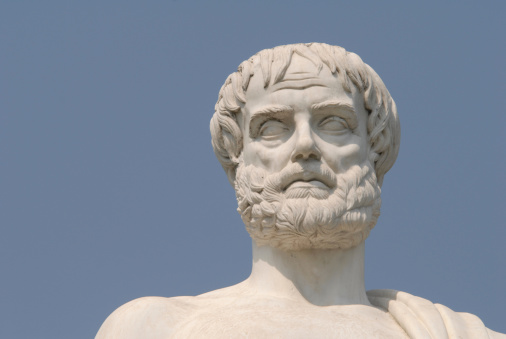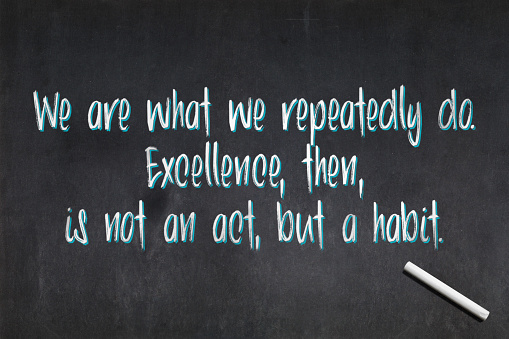
The ancient Greek philosopher Aristotle valued education as an imperative to the holistic development of an individual. He considered education to be the only path to live a fulfilling life and become a satisfied human being. He expresses his ideas on education in his notable work On Education, to which we have access in a very fragmented fashion; only scraps of this work has survived. He believed that educators should possess a clear philosophy of life and emphasize deeply on the ethical and political. He also argued that the body, mind and soul of an individual require all-round, balanced development which is not just limited to the domains of academics. He also attempted a categorization of disciplines into theoretical, practical and technical. Aristotle formulated a dualistic approach to education that contains- dedication through reason and education through habit.
Table of Contents
Aristotle Quotes on Education

- “Knowing yourself is the beginning of all wisdom.”
- “It is the mark of an educated mind to be able to entertain a thought without accepting it.”
- “Educating the mind without educating the heart is no education at all.”
- “The educated differ from the uneducated as much as the living from the dead.”
- “The roots of education are bitter, but the fruit is sweet.”
- “It is this simplicity that makes the uneducated more effective than the educated when addressing popular audiences—makes them, as the poets tell us, ‘charm the crowd’s ears more finely.’ Educated men lay down broad general principles; uneducated men argue from common knowledge and draw obvious conclusions.”
- “All who have meditated on the art of governing mankind have been convinced that the fate of empires depends on the education of youth.”
- “No great mind has ever existed without a touch of madness.”
- “Excellence is never an accident. It is always the result of high intention, sincere effort, and intelligent execution; it represents the wise choice of many alternatives – choice, not chance, determines your destiny.”
- “Those who educate children well are more to be honoured than they who produce them; for these only gave them life, those the art of living well.”
- “Education is an ornament in prosperity and a refuge in adversity.”
- “Education is the best provision for old age.”
- “The best way to teach morality is to make it a habit with children.”
- “The one exclusive sign of thorough knowledge is the power of teaching.”
- “Wit is educated insolence.”
- “All men by nature desire knowledge.”
- “The habits we form from childhood make no small difference, but rather they make all the difference.”
- “We acquire a particular quality by acting in a particular way.”
- “Since the whole city has one end, it is manifest that education should be one and the same for all, and that it should be public, and not private – not as at present, when every one looks after his own children separately, and gives them separate instruction of the sort which he thinks best; the training in things which are of common interest should be the same for all. Neither must we suppose that any one of the citizens belongs to himself, for they all belong to the state, and are each of them a part of the state, and the care of each part is inseparable from the care of the whole.”
- “Our youth should also be educated with music and physical education.”
- “Education and morals will be found almost the whole that goes to make a good man.”
- “To learn is a natural pleasure, not confined to philosophers, but common to all men.”
- “Anything that we have to learn to do we learn by the actual doing of it; People become builders by building and instrumentalists by playing instruments. Similarily, we become just by performing just acts, temperate by performing temperate ones, brave by performing brave ones.”
- “It is evident, then, that there is a sort of education in which parents should train their sons, not as being useful or necessary, but because it is liberal or noble.”
- “Education begins at the level of the learner.”
- “Youth should be kept strangers to all that is bad, and especially to things which suggest vice or hate. When the five years have passed away, during the two following years they must look on at the pursuits which they are hereafter to learn. There are two periods of life with reference to which education has to be divided, from seven to the age of puberty, and onwards to the age of one and twenty.”
- “Those who know, do. Those that understand, teach.”
- “To write well, express yourself like the common people, but think like a wise man.”
- “That education should be regulated by law and should be an affair of state is not to be denied, but what should be the character of this public education, and how young persons should be educated, are questions which remain to be considered. As things are, there is disagreement about the subjects. For mankind are by no means agreed about the things to be taught, whether we look to virtue or the best life. Neither is it clear whether education is more concerned with intellectual or with moral virtue.”
- “Learning is not child’s play; we cannot learn without pain.”
- “There are branches of learning and education which we must study merely with a view to leisure spent in intellectual activity, and these are to be valued for their own sake; whereas those kinds of knowledge which are useful in business are to be deemed necessary, and exist for the sake of other things.”
- “The mathematical sciences particularly exhibit order symmetry and limitations, and these are the greatest forms of the beautiful.”
- “The energy of the mind is the essence of life.”
- “Life in accordance with intellect is best and pleasantest, since this, more than anything else, constitutes humanity.”
- “Wise men speak when they have something to say, fools speak because they have to say something”
- “Great men are always of a nature originally melancholy.”
- “Through discipline comes freedom.”
- “Memory is the scribe of the soul”
- “Whatever lies within our power to do lies also within our power not to do.”
- “If you would understand anything, observe its beginning and its development”
Download our Evolve App and get access to a myriad of journeys related to self-improvement, meditation, mindfulness, self-esteem, patience, productivity and a lot more. The app also has more than 50 audios to help you grasp concepts related to mental health and mental wellness very easily. Download today without delay and try for free on Android and Apple.
Also Read: 12 Virtues of Aristotle
4 Cardinal Virtues- Aristotle and Plato
10 Stoic Principles Simplified for you!
Damayanti Dubey is a final year English major at Loreto College, Kolkata. She is a writer by passion and loves to indulge in languages, especially English, Bengali, and Urdu. She aims at exploring all of their intricacies and nuances. Damayanti is a disciple of Padma Bhushan Pandit Ajoy Chakraborty and is a national scholar of Indian classical music. She has always believed that a sound mind, free from the clutches of regressive and negative thoughts is the key to living a healthy life and makes efforts to promote mental wellness through the power of her words.
Damayanti believes in thinking beyond boundaries.
